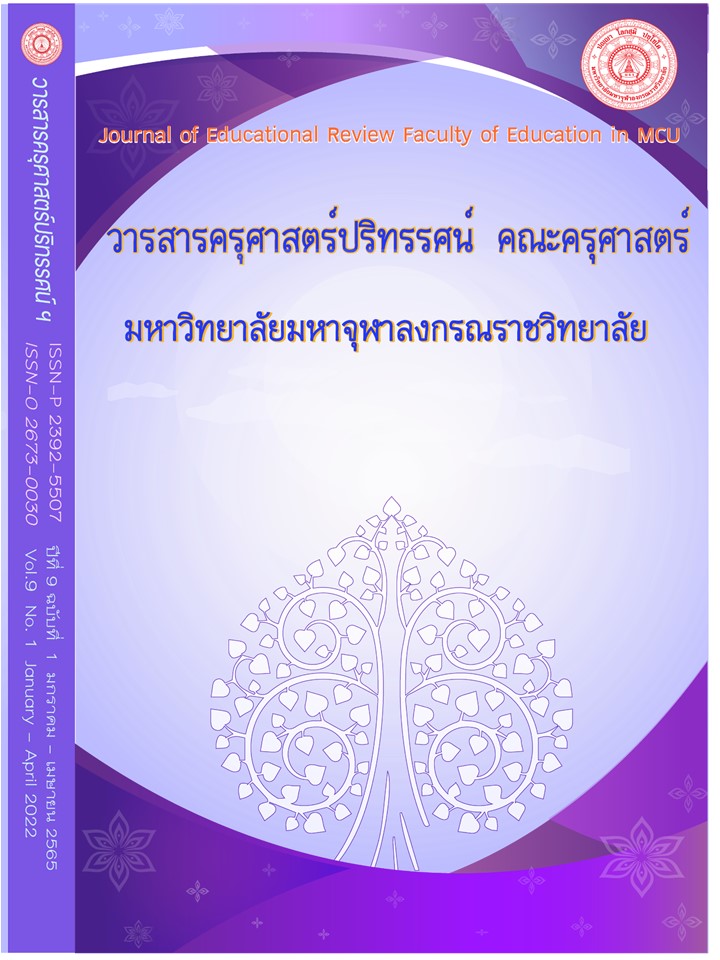GUIDELINES FOR THE DEVELOPMENT OF LEARNING RESOURCES ACCORDING TO THE BUDDHIST EDUCATIONAL ADMINISTRATION PRINCIPLES FOR TEMPLES IN PATHUM THANI PROVINCE
Main Article Content
Abstract
The objectives of this research are: 1) to study the context and readiness in learning resources management of temples in Pathum Thani province, 2) to study a guideline for development of learning resources management of temples in Pathum Thani province according to Buddhist educational administration principles, and 3) to propose guidelines for development of learning resources management of temples in Pathum Thani province according to Buddhist educational administration principles. The mixed research method was used in the study. The quantitative data were collected by questionnaire from 123 abbots in Pathum Thani province and analyzed by frequency, percentage, mean, standard deviation, and PNI Modified. The qualitative data were collected by interview with 5 experts analyzed by content analysis. The result of the study found that: 1) In the context and readiness in learning resource management of temples in Pathum Thani province, the first significant one was on (1) learning assessment and follow-up, followed by (2) learning resource management, (3) learning equipment, (4) learners, (5) learning activities, (6) learning process management, (7) operators of learning activities, (8) learning location and (9) sources of knowledge and contents of knowledge. 2) Guidelines for development of learning resource management of temples in Pathum Thani province according to Buddhist educational administration principles were based on the 7 principles of Sappaya. In order to keep ready in each aspect, those who were involved have to set up practical policy in development and improvement for working in the same direction. 3) The guidelines for development of learning resource management of temples in Pathum Thani province according to Buddhist educational administration principles consist of the following principles of Sappaya: (1) Avasa-Sappaya, the learning resource should be clean and tidy, (2) Gocara-Sappaya, the area diagram should have location map clearly, (3) Bhassa-Sappaya, the operators of activities can motivate participants to join activities, (4) Puggala-Sappaya, the policy maker have to push the activities forwards to achievement,
(5) Bhojana-Sappaya, the food should be of quality and healthcare, (6) Utu-Sappaya, the environment and the weather should be optimum temperature and creating the environment for long-time activities, and (7) Iriyapatha-Sappaya, the activities should be in balance with physical movement.
Article Details

This work is licensed under a Creative Commons Attribution-NonCommercial-NoDerivatives 4.0 International License.
ทัศนะและความคิดเห็นที่ปรากฏในบทความในวารสารฉบับนี้ถือเป็นความรับผิดชอบของผู้เขียนบทความนั้นเพียงผู้เดียว และไม่ถือเป็นทัศนะและความรับผิดชอบของกองบรรณาธิการ
กองบรรณาธิการขอสงวนสิทธิ์ในการคัดเลือกบทความลงตีพิมพ์และจะแจ้งให้เจ้าของบทความทราบหลังจากผู้ประเมินบทความตรวจอ่านบทความแล้ว
ต้นฉบับที่ได้รับการตีพิมพ์ในวารสารครุศาสตร์ปริทรรศน์ คณะครุศาสตร์ มหาวิทยาลัยมหาจุฬาลงกรณราชวิทยาลัย ถือเป็นกรรมสิทธิ์ของคณะครุศาสตร์ มหาวิทยาลัยมหาจุฬาลงกรณราชวิทยาลัย ห้ามนำข้อความทั้งหมดหรือบางส่วนไปพิมพ์ซ้ำ เว้นเสียแต่ว่าจะได้รับอนุญาตจากมหาวิทยาลัยฯ เป็นลายลักษณ์อักษร
References
กองพุทธศาสนาสถาน สำนักงานพระพุทธศาสนาแห่งชาติ. (2553). วัดพัฒนา’52. กรุงเทพมหานคร:
โรงพิมพ์สำนักงานพระพุทธศาสนาแห่งชาติ.
ครรชิต พุทธโกษา. (2554). คู่มือการพัฒนาชุมชนแห่งการเรียนรู้ ฉบับสมบูรณ์. แหล่งที่มา http://www.kruinter.com/file/29720141006205700-%5Bkruinter.com%5D.pdf สืบค้นเมื่อ 24 มิ.ย. 2563
ธงชัย สันติวงษ์ และ ชัยยศ สันติวงษ์. (2533). พฤติกรรมบุคคลในองค์การ. พิมพ์ครั้งที่ 2. กรุงเทพมหานคร: ไทยวัฒนาพานิช.
ประพันธ์ศิริ สุเสารัจ. (2540). การพัฒนากีฬาชาติ: การศึกษาประสิทธิผลของสมาคมกีฬาสมัครเล่นแห่งประเทศไทยกับปัจจัยที่เกี่ยวข้อง. ดุษฎีนิพนธ์การศึกษาดุษฎีบัณฑิต. มหาวิทยาลัยศรีนครินทรวิโรฒประสานมิตร.
พระครูวัฒนสุตานุกูล (วีรวัฒน์ ลทฺธคุโณ). (2558). กระบวนการพัฒนาวัดให้เป็นแหล่งการเรียนรู้ของคณะสงฆ์ไทย. ดุษฎีนิพนธ์พุทธศาสตรดุษฎีบัณฑิต. มหาวิทยามหาจุฬาลงกรณราชวิทยาลัย.
พระครูสังฆรักษ์วุฒิพงษ์ วุฑฒิวํโส. (2560). การพัฒนาวัดในประเทศไทยเป็นแหล่งเรียนรู้เชิงพุทธเพื่อส่งเสริมการท่องเที่ยวอาเซียน. ดุษฎีนิพนธ์พุทธศาสตรดุษฎีบัณฑิต. มหาวิทยามหาจุฬาลงกรณราชวิทยาลัย.
พระราชวรมุนี (ประยุทธ์ ปยุตฺโต). (2530). บทบาทของพระสงฆ์ในสังคมไทยปัจจุบัน, หนังสือชุดหลักธรรมเฉลิมพระเกียรติ เล่ม 54/60, กรุงเทพฯ : โรงพิมพ์การศาสนา.
สนิท ศรีสำแดง. (2547). พุทธศาสนากับการศึกษา. กรุงเทพมหานคร: โรงพิมพ์มหาจุฬาลงกรณราชวิทยาลัย.
สุภางค์ จันทวานิช. (2540). วิธีวิจัยเชิงคุณภาพ. กรุงเทพมหานคร: โรงพิมพ์มหาจุฬาลงกรณราชวิทยาลัย.
สุวิมล ว่องวาณิช. (2558). การวิจัยประเมินความต้องการจำเป็น. กรุงเทพมหานคร: สำนักพิมพ์แห่งจุฬาลงกรณ์มหาวิทยาลัย.
อานนท์ อาภาภิรมย์. (2521). สังคมและวัฒนธรรมไทย. กรุงเทพมหานคร: บำรุงนุกูลกิจการพิมพ์.
Peters T. and Waterman R. (1982). In Search of Excellence; Lessons From America's Best Run Companies. New York: Harper & Row.


